Mathematics
Emma Sbizzirri

Mathematics
Emma Sbizzirri
It has been wonderful to see and hear all the students get involved and excited in Maths over the past fortnight.
Teachers have worked creatively to design tasks which link to real-life examples and require students to problem-solve, design, hypothesize, construct and justify.
Have a look through some of the examples:






Dr. Paul Swan is an inspirational mathematics consultant from Western Australia, who regularly shares his exciting ideas, videos, and resources on his site. He has created a resource page to support students and parents during Home Online Learning. Many of the resources are free to download and continue to focus on developing students' mathematical literacy.
Dr. Paul Swan's website of resources (with instructions) can be found here:
https://drpaulswan.com.au/resources/
Continuing on our spotlighted feature of the Numeracy@Home website, this week we explore patterns and time words.
Noticing, describing and creating patterns helps students learn and develop their mathematical thinking. Encourage students to describe, copy, represent and extend patterns found in everyday situations.
Some possible holiday ideas with patterns:
Using Time words
Students develop a sense of time by experiencing, noticing and describing routines. It is important to support children to notice and talk about things that happen in the morning, afternoon, or night, explore routines on different days of the week, and discuss when special celebrations occur. You can support your child's development of time by using appropriate language, and noticing calendars and clocks.
Possible questions to support include:
As always, remember Essential Assessment is a handy resource to use to continue to practice the automatic recall of number facts or to revise key concepts explored this Term.
While we recognise that all children learn their times tables differently, we have listed some handy resources which you might like to use over the school holidays: